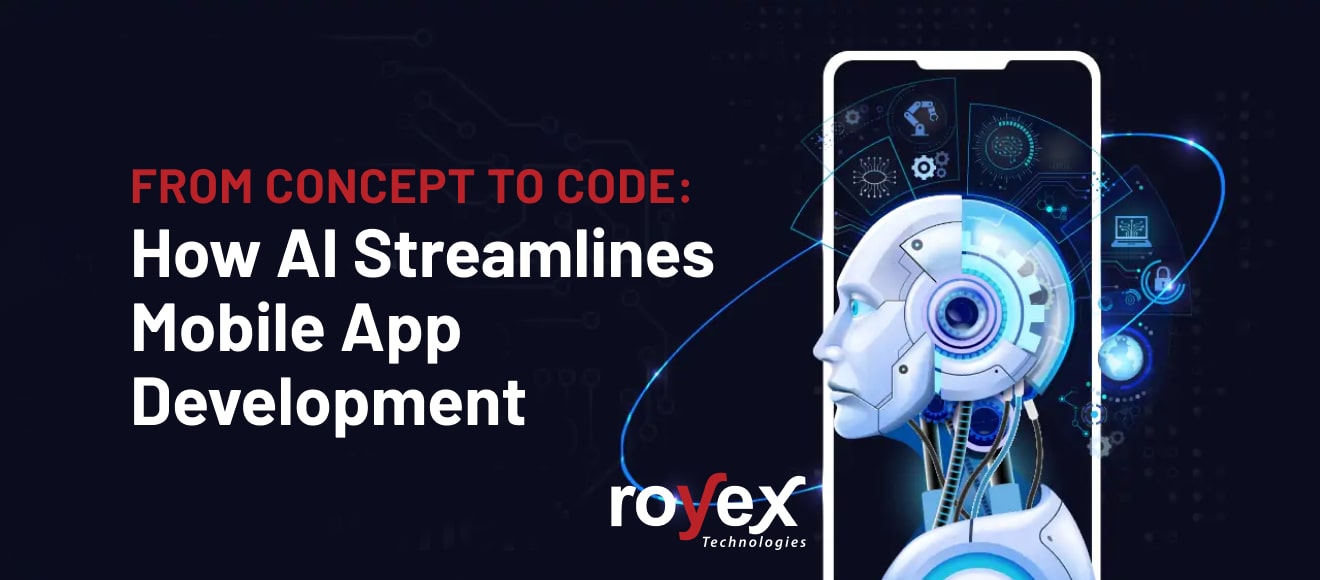
From Concept to Code: How AI Streamlines Mobile App Development
The Challenges of Traditional Mobile App Development

Before AI, developing a mobile app involved several manual steps:
-
Conceptualization and Planning: Turning an idea into a clear app concept took time and required extensive brainstorming.
-
UI/UX Design: Designing user-friendly and visually appealing interfaces was labor-intensive.
-
Coding: Writing code from scratch demanded skilled developers and many hours of work.
-
Testing: Ensuring the app worked perfectly on different devices and platforms required rigorous manual testing.
-
Deployment: Publishing the app and maintaining its performance was a continuous effort.
This traditional approach was not only time-consuming but also costly, especially for startups and small businesses.
How AI Is Streamlining Mobile App Development

AI introduces tools and technologies that automate and optimize every stage of app development. Here’s how:
1. Generating Ideas and Features
AI helps developers turn vague concepts into concrete ideas. By analyzing market trends, user preferences, and competitor apps, AI tools can recommend features that appeal to target audiences.
For example:
-
AI tools like ChatGPT or Bard can brainstorm app ideas based on user needs.
-
Market analysis tools powered by AI identify gaps in existing apps, suggesting unique features to include.
2. Designing User Interfaces (UI/UX)
Creating intuitive and appealing designs is critical for any app’s success. AI simplifies this by automating the design process:
-
AI-powered design tools like Figma and Adobe XD use algorithms to suggest layouts, color schemes, and design elements.
-
Some tools analyze user behavior data to create personalized UI/UX designs that improve user engagement.
3. Writing Code
AI doesn’t replace developers but assists them by generating code faster and with fewer errors.
-
Tools like GitHub Copilot and OpenAI Codex help developers write code by suggesting snippets, functions, or even entire modules.
-
AI detects errors in real-time, reducing debugging efforts.
-
Frameworks with AI integration, such as Flutter or React Native, enable cross-platform app development, minimizing coding duplication.
4. Testing and Debugging
AI enhances testing by automating repetitive tasks and identifying issues before they affect users:
-
Automated testing tools like Testim or Applitools use AI to simulate real-world usage and detect bugs.
-
Predictive analytics powered by AI helps forecast potential issues based on historical data.
-
AI tools ensure compatibility across devices, operating systems, and screen sizes.
This reduces the time and cost of manual testing while improving app reliability.
5. Personalizing User Experiences
AI algorithms personalize app experiences based on user preferences and behavior:
-
E-commerce apps suggest products based on past purchases.
-
Fitness apps create tailored workout plans based on individual fitness levels.
-
Streaming apps recommend content based on viewing history.
AI-powered personalization enhances user engagement, retention, and satisfaction.
6. Optimizing App Performance
AI monitors app performance post-launch and provides insights for optimization:
-
AI-based analytics tools track app usage, crash rates, and user feedback in real time.
-
Machine learning algorithms predict usage patterns, helping businesses make data-driven updates.
7. Accelerating Development Timelines
By automating repetitive tasks, AI speeds up the overall app development timeline. Businesses can launch apps faster, gaining a competitive edge in the market.
Real-World Examples of AI in Mobile App Development
-
Uber: Uber uses AI to optimize routes, predict demand, and personalize user experiences within its app.
-
Spotify: Spotify’s AI algorithms recommend playlists and songs tailored to each user’s taste, improving engagement.
-
Snapchat: AI powers Snapchat’s filters, enabling real-time facial recognition and augmented reality effects.
-
Duolingo: AI personalizes lessons, adapting difficulty levels to individual learners’ progress.
Benefits of AI in Mobile App Development
-
Cost Efficiency: AI reduces development costs by automating time-consuming tasks.
-
Faster Time-to-Market: AI speeds up the process, allowing businesses to launch apps quickly.
-
Enhanced User Experience: AI creates personalized and engaging experiences for users.
-
Improved Quality: AI-powered testing ensures apps are reliable and bug-free.
-
Scalability: AI enables apps to handle growing user bases without performance issues.
The Future of AI in Mobile App Development
As AI technology evolves, its role in mobile app development will only grow. Future possibilities include:
-
AI-Driven Prototyping: AI could create fully functional app prototypes from simple ideas or sketches.
-
Voice-Powered Development: Developers might use voice commands to build apps, making the process even more intuitive.
-
Enhanced Personalization: AI will deliver even more precise personalization based on advanced predictive analytics.
Conclusion
AI is revolutionizing mobile app development by streamlining every step from concept to code. Whether it’s generating ideas, designing interfaces, writing code, or testing, AI-powered tools make the process faster, more efficient, and more user-focused.
For businesses looking to build mobile apps, embracing AI can provide a competitive edge, reduce costs, and improve customer satisfaction.
AI offers a plethora of options suitable for various company sizes and financial capacities. Should you require internal expertise to navigate suitable tools for your business, consulting a leading artificial intelligence (AI) company in Dubai, like Royex Technologies, can prove invaluable.
Check our portfolio to see our previous works. Contact us via email at info@royex.net or call us at +971566027916. To get started with us.





